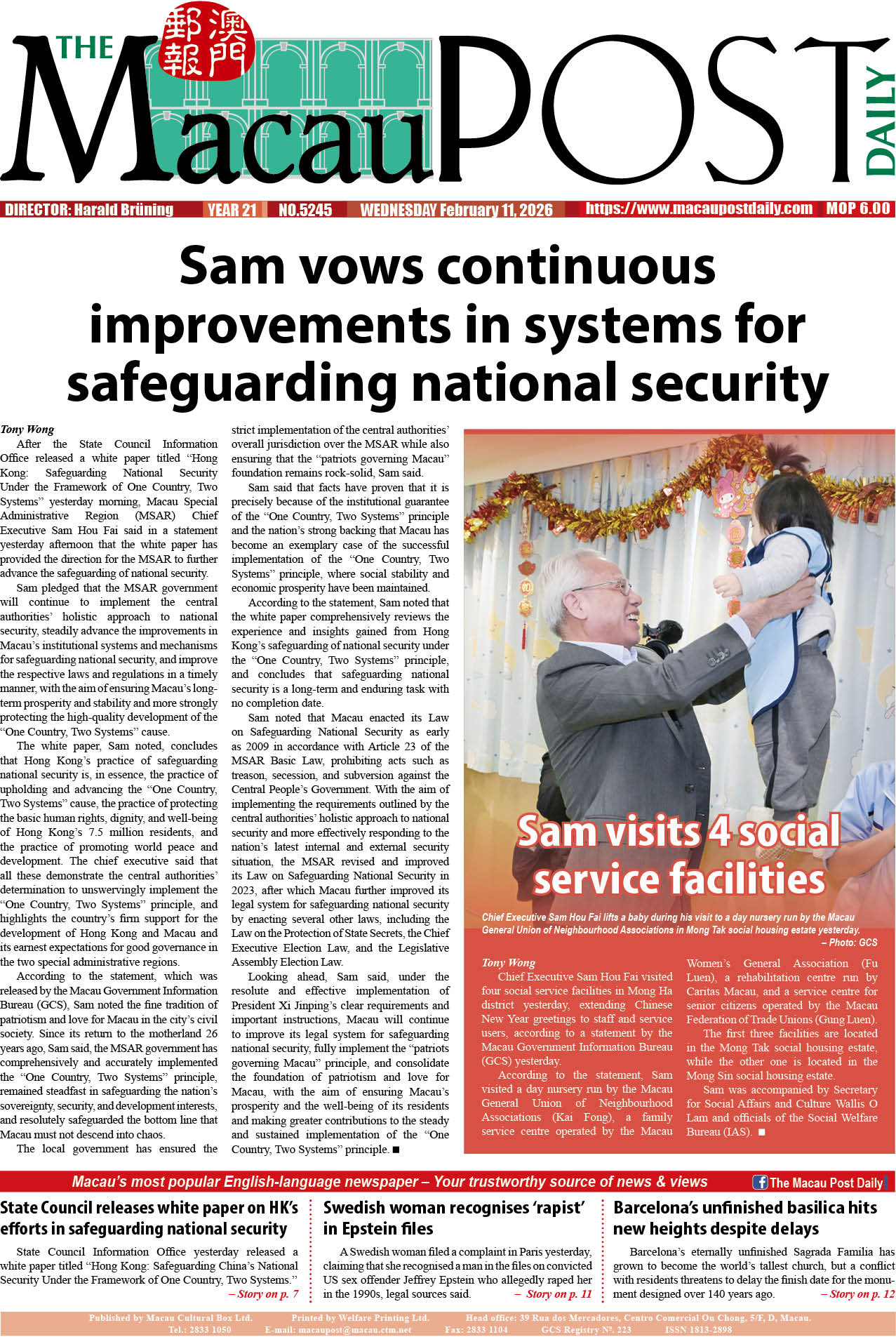The Legislative Assembly (AL) yesterday unanimously passed a government-initiated bill amending the Legislative Assembly Election Law, according to which the Committee for Safeguarding National Security of the Macau Special Administrative Region (MSAR) will be tasked with assessing whether legislative election candidates uphold the MSAR Basic Law and bear allegiance to the MSAR.
The amendment bill’s outline was passed during a plenary session of the legislature in December last year, after which the bill was reviewed by its 2nd Standing Committee, before it was resubmitted to yesterday’s plenary session, which Secretary for Administration and Justice André Cheong Weng Chon attended, when it was voted on article-by-article in its second and final reading.
The amended Legislative Assembly Election Law will take effect on the day after its promulgation in the Official Gazette (BO).
The MSAR Legislative Assembly election, which takes place every four years, comprises direct and indirect elections. The current legislature has 33 members, comprising 14 deputies directly elected by universal suffrage, 12 deputies indirectly elected by registered association representatives and seven deputies appointed by the chief executive.
The next legislative direct and indirect elections will be held next year.
According to the Legislative Assembly Election Law’s amended version, when the Legislative Assembly Electoral Affairs Commission (CAEAL) is assessing legislative election candidates’ qualifications, it will be required to request the Committee for Safeguarding National Security of the MSAR to assess whether the candidates uphold the MSAR Basic Law and bear allegiance to the MSAR.
If the CAEAL decides to disqualify a legislative election candidate after the Committee for Safeguarding National Security of the MSAR has concluded that he or she does not uphold the MSAR Basic Law or has been disloyal to the MSAR, the respective candidate cannot file an appeal to the CAEAL nor the courts against the decision, according to the amended Legislative Assembly Election Law.
In such circumstances, according to the law’s amended version, he or she will also be ineligible to stand as a candidate for the next five years.
Moreover, the amended law will criminalise those who publicly incite others to cast blank or invalid votes, or to abstain from voting, in the legislative election. The offenders will face a prison term of up to three years.
The law’s amended version will also extend the scope of those who will be fined after announcing the results of an election opinion poll during the election campaign period.
The current version of the Legislative Assembly Election Law bars the announcement of election opinion poll results during the election campaign period. However, according to the law’s current version, only media organisations, advertising companies, and polling institutions or companies are fined between 10,000 patacas and 100,000 patacas for violating this rule.
According to the law’s amended version, any individuals and entities will face a fine for violating this rule.
Yesterday’s passage of the Legislative Assembly Election Law’s amendment bill in its second and final reading came after the amended Chief Executive Election Law took effect on January 1.
The Chief Executive Election Law’s amendment bill was passed by legislators in its second and final reading in December last year.
Amendments to the Chief Executive Election Law and to the Legislative Assembly Election Law are similar. The local government has underlined that amendments to the two laws aim to ensure the full implementation of the “patriots governing Macau” principle.
In addition to Legislative Assembly President Kou Hoi In, yesterday’s plenary session was attended by 29 legislators, with three of their colleagues absent. All 29 lawmakers voted in favour of all provisions listed in the Legislative Assembly Election Law’s amendment bill. As is customarily, the speaker refrained from voting.

Secretary for Administration and Justice André Cheong Weng Chon speaks during yesterday’s plenary session in the Legislative Assembly’s (AL) hemicycle. – Photo: GCS









